Conxa Rodà
The Museu Nacional has collaborated with the Johns Hopkins University of Washington to host in Barcelona, in January 2016, an onsite seminar within its Online Master of Arts in Museum Studies, as we had already done in 2012.
Entitled Museums in Changing Times, the academic programme, of two weeks’ duration, was made up of sessions in class, visits to museums, project works, and workshops of wikipedia and contents strategy.
It has been a magnificent opportunity for our museums to collaborate with one of the most prestigious American universities and to make known the renovation and the projects that we are carrying out.
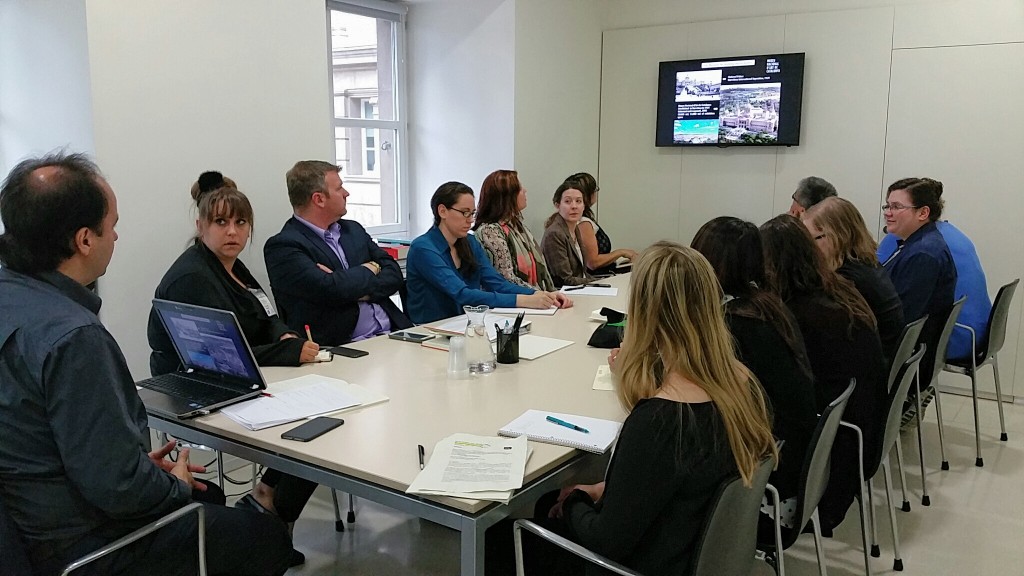
The JHU group in the office of the director, Pepe Serra, in one of the initial sessions. Photo: Conxa Rodà
The comments of the participants are highly eloquent of how they took advantage of, and enjoyed, this opportunity. We reproduce here a selection that includes substantial reflections on museums today:
General comments about the seminar Museums in Changing Times
“The course objectives related to Barcelona museums, learning the European museum system, and connecting with museum professionals in the region were clearly met (and even exceeded). The fourth course objective, based in collaboration, was also met (and exceeded). […] The program was obviously successful in many academic aspects, and for me it was also very personally fulfilling. I don’t imagine that any of the student participants will encounter another class like this one, but we will definitely remember each and every moment of our two weeks in Barcelona”. (Kiersten)
“I felt that I got a lot out of these two weeks because they were hands-on and intensive. We had to push ourselves at times and fight through the fatigue but I wouldn’t have changed a minute of it”. (Victoria)
“The on-site seminar exceeded my expectations and certainly satisfied the objectives set for this program. Each morning we were given the opportunity to talk candidly to a museum professional”. (Sarah B)
“Going into the seminar, I was curious how the title “Museums in Changing Times” fit into my interests in collections, but by the end of the seminar, I learned just how encompassing and relevant that title is not only to collections but also to many other aspects of museums that concern me. To me, the most sweeping changes seem to be coming from museums reacting to social changes or shifts in public perception and opinion; they are big changes because they constitute a fundamental, philosophical change in what the role of a museum is in society”. (Ed)
“The workshops illustrated the power of museums to engage audiences that may not be able to physically visit the museum, and that engagement of visitors begins before they set foot within the organizations walls. A museums digital content, social media, and Wikipedia pages all illustrate that idea”. (Abby)
“My classmates, our teachers, and our visits to different foundations and museums made it a trip of a lifetime. I learned so much”. (Elizabeth)
“The Johns Hopkins University Barcelona seminar was an amazing experience and will remain in my mind for a long time to come. From the beautiful sites and welcoming people to the amazing museum visits and educational discussions, my life has been impacted in many ways, both personally and career wise, and I cannot wait to start implementing these changes”. (Katrina)
Visits to Catalan museums
In the visits we have tried to organise a meeting with the director, manager or other professionals of the centre, as well as being able to visit the collections, the reserves, or other spaces that each museum has considered to be opportune. The museums which we visited, apart from the Museu Nacional d’Art de Catalunya, were: Fundació Miró, Museu Picasso, MACBA, Museu del Disseny, Fundació Tàpies, La Pedrera, Sagrada Família, Museu d’Història de Barcelona, Empúries and Museu Dalí.
“The variety of people we have met who have given their time, knowledge and resources to us as a collective group has been astounding. I am feeling full of gratitude for this opportunity to learn and share in this way”. (Taliaferro)
“This was yet another unique perspective that could not be gained anywhere else. In particular, I felt so inspired by our time with Pepe Serra, Director of MNAC, as his passion for museums is contagious”. (Kiersten)
“What an experience it has been! I knew that I would have fun and learn a lot, but I didn’t expect for it to be quite as fantastic as it was. I was so impressed with the number of not only museum professionals, but directors (!) that we got to speak to. It was also surprising how straight forward they were with us and that they answered all of our questions without hesitation”. (Sarah W)
“The generosity of the professionals at The Design Museum, and all the museums we’ve been to, was amazing! The amount of time that they spent with us, and the willingness to show us spaces was fantastic. This generosity is seen through the museum community, and is one of the reasons I love working in museums”.
“I have taken courses in collections management and conservation, but now those classes feel like they were incomplete without our tours of the storage areas and conservations labs at MNAC, MACBA, and Museu del Disseny”. (Ed)
“Mr. Roca, director of MuHBA, the History Museum of Barcelona, stated that what should be historical about a museum are the objects, not the behind-the-scenes processes. I took this as meaning that museums need to be forward thinkers and use digital trends”. (Katrina)
“The focus has been on museums in changing times and, if I follow Ferran Barenblit’s advice of, “Always think your talent is needed”, I have faith that I will find myself helping museums with their transformations”. (Kim)
Usefulness for the work of their own museums and for the future
“This will influence my work with my docent guides, and artisans, encouraging them not to just dump information on our guests, but invite them into the story telling. On the whole the seminar was amazing”. (Abby)
“Thank you all for creating this collective museum think tank around our seminar which might propel us to be the agents of museum change in the future”. (Taliaferro)
“I have learned so much and have enjoyed every minute of the seminar. I feel like many of the things I learned and implemented on the project will be able to be used in my career future”. (Katrina)
“I interact with all departments. I need to have a full understanding of all department needs in order to perform my position effectively. Throughout this Master’s program and the seminar, I have tried to gain a better understanding of all departmental needs so I can provide the utmost service to them”. (David)
“While every class in the JHU Museum Studies program provides a mixture of theoretical and practical knowledge, in this seminar especially I was able to gain so much inspiration and background applicable to my own work, from other museum professionals, from our readings, and from our lectures. It is practical knowledge like this that makes this whole program so attractive. I know that each class will leave me with new knowledge that I can use the very next day at work”. (Kiersten)
“That is one of the main things I will take away from this class; the sense that I am now part of a community of museum professionals. Because I do not currently work in a museum, I always feel like I have little to add to class discussions. Now, I realize I can contribute to the field just as much in other ways than actually working inside a museum”. (Kim)
“It is the stories we tell that make us, the professionals, excited and the visitor engaged. I hope to connect objects, ideas and people in museums and the arts at large with the new tools leveraged from this excellent seminar”. (Taliaferro)
“I am trying to grow in my position and this will help me bring creative ideas and evaluative thinking to the table”.
“I will return to the States excited about my work in museums and ready to share everything I’ve learned!” (Allison)
Wiquipedia
With the collaboration of Amical Wikimedia, a workshop was held about editing in Wikipedia and, subsequently, the participants had to create an article about one of the works or artists of the museum. In this way we train new contributors to the universal encyclopaedia and we improve the quantity and quality of the information of our collection.
“In all of my studies, I was always forbidden to use wikipedia and I find it ironic that for this class I was required to learn how to create one. Oh what my high school teachers would think of me now! I was surprised to discover how much work actually went into creating a wikipedia project, and I hope that once I get back to the States I will be able to use my skills to update my museum’s wiki page”. (Victoria)
“Foremost, I like the idea that wikipedia is more a community effort rather than a single person’s research. As the future of museums and other institutions struggle with the idea of transitioning into “mobile” or “digital”, they should appreciate that it is a way to market to their audiences and connecting them to different communities”. (Ako)
“It was very enlightening to learn about the dynamics of Wikipedia. I had no idea that people were involved to this extent in the creation and the updating of Wikipedia pages. I enjoyed the community feel and the collaboration between Wikipedians. Knowing what I know now, I think I will get much more involved in creating and editing new Wikipedia pages”. (David).
“Joan Roca stated that “the simplest words to create are the hardest to get.” This was learned as students did many hours of in-depth research to pull together value adding Wikipedia articles”. (Abby)
“Ultimately, the utilization of Wikipedia in museums is a win-win proposition. I found that students would make the ideal Wikipedia editors because 1) they are adept at research and 2) they are invested in either the subject or the grade. By and large, the Wiki project was rewarding, save for the small technical glitches several of us encountered. While I know Wiki is a collaborative project, I still feel proprietary and proud of my article. Even if I check it in three years’ time and it has changed beyond recognition, I will still know that I started it and got people interested in the piece enough to research it and edit the page. I also know now that it is not about being perfect, but getting it out there. I have a new respect for Wikipedia and those who devote their time in editing to teach others”. (Kim)
“The Wikipedia project was very enlightening, Being able to edit and improve Wikipedia fulfills one of the main missions of all museums: education. I do plan to continue to edit Wikipedia pages, as well as create a page or two for the new local history museum I am working with”. (Katrina)
“I found it to an amazing experience. It was a little stressful to try to get everything done in such a short time but everything worked out in the end. My wiki article turned out great and gave me the sense of helping out the museum. It is strange to think that people all over the world are able to read an article I wrote. I have checked on it several times and a few small edits have been made since it went live. After learning more about Wikipedia and how to properly contribute, I will continue to edit and create articles”. (Elizabeth)
Content strategy
The other workshop of the seminar was dedicated to content strategy, a key topic for attracting the users and for connecting the collections and the knowledge to the public.
“As I do not currently work in a museum, so the content strategy option had little appeal to me. I could not have been more mistaken. Content strategy is applicable to my current job and, I imagine, my future jobs”. (Elizabeth)
“One major reason I decided to participate in the content strategy project was to further my own career goals. It was, of course, a fantastic exercise in critical thinking and helped me to see what I should work on personally to further my goals”. (Kiersten)
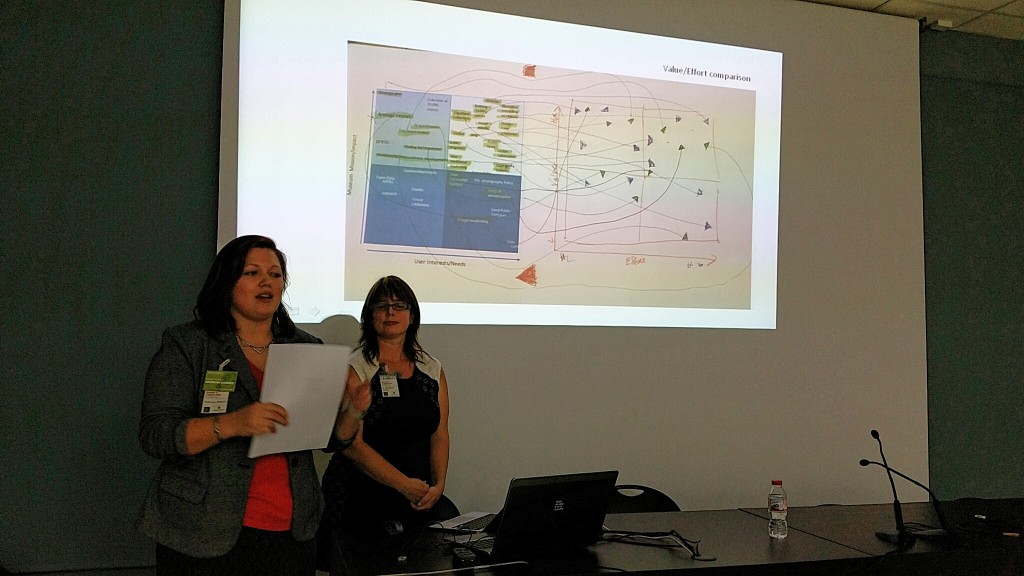
Presentation of the project of content strategy: a magnificent example of the creativity and capacity for critical analysis demonstrated by the group
“The project was a wonderful opportunity to examine content onsite and online inclusive of collections in the context of the user experience and social media planning. It re-emphasized and built upon my knowledge around the role content can play in an institution’s strategic planning. I see great inherent value in connecting the content of our museums in a cohesive way from how we communicate internally, to our exhibitions onsite and online inclusive of social media and Wikipedia. This notion of integrated content connection is very much in line with Conxa’s perspective of the “museum as a connector: circle of connect- content- knowledge”. (Taliaferro)
“Knowledge is key and this knowledge provided me insight into my museum’s content strategy. Based on these criteria, I don’t think my museum is doing this effectively”.
“Of all of the topics covered in the seminar, content strategy is the one that I felt that I learned the most about, and I have already been thinking about how my children’s museum might benefit from an analysis and prioritization of content items and content distribution methods that we discussed”. (Ed)
Social Media
“I hope to gather together a strategic plan for my museum to bring in more social media. The museum is lacking things like twitter, instagram, and just recently got a Facebook page. The staff, board, and volunteers complain that we are not getting enough visitors and public recognition, so I believe a great way to inform the community that we do exist is by putting ourselves out there on social media”. (Victoria)
“I especially enjoyed the slideshow on expanding a museum’s social media strategy and how to do it effectively, including listening, creating, presenting, broadcasting, measuring, and adapting”. (David)
“Another aspect of digital technology in museums that I enjoyed exploring was the rise of social media use by museums. Before the seminar, I only occasionally tweeted, and my use of Instagram was nearly non-existent. During the seminar, though, I found myself posting almost non-stop to both Twitter and Instagram. The fact that so many strangers have responded to my posts has made me think about how museums can use social media not only to engage their existing audiences but also attract new ones”. (Ed)
Talk: Museums training in the 21st-century
Taking advantage of the presence in Barcelona of the director of the master’s degree course of Museum Studies, Phyllis Hecht, we proposed that she gave an open talk to professionals of museums about the training needs of today’s museums.
Many of us who work in museums are very well aware that the training acquired over time is not enough to be able to fully develop the new roles and the new skills that the current times require. Phyllis explained this in a very graphic way by mentioning some of the mission statements of museums from all over the world. Seeing them it became very clear that to respond to new functions such as improving the experience of the user, creating good narratives, fostering the participation and co-creation, analysis, and collaborative work, we need to develop new skills – either digital or not digital. That’s why it is so urgent that the training offer from within the institutions is adapted to these new needs. We will all win, the museums and the public.
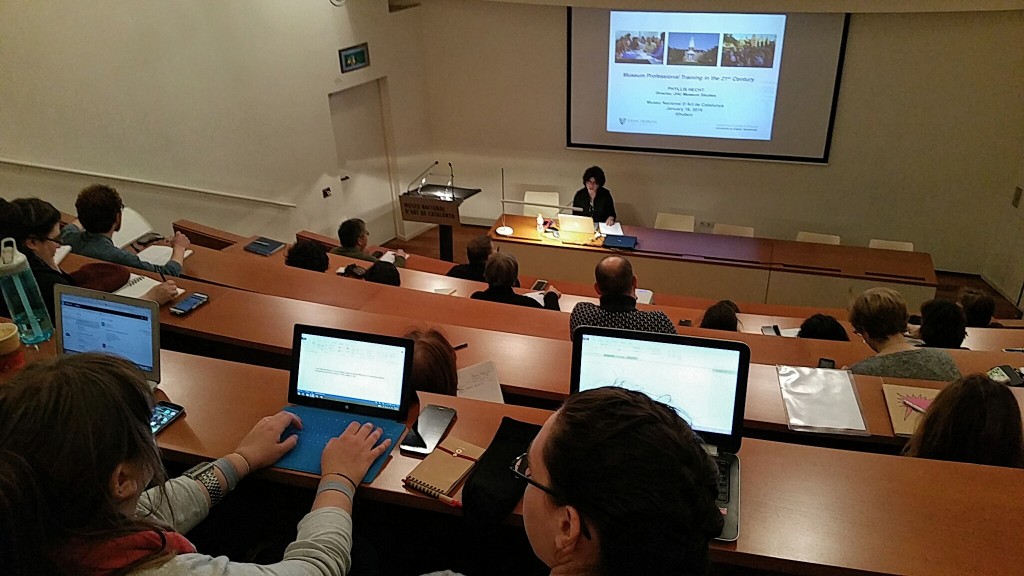
Phyllis Hecht giving the talk Museums training in the 21st-century in the auditorium of the Museu Nacional
Finally, some words of gratitude, first of all to the Johns Hopkins University, and its programme of Museum Studies for having trusted us to carry out the seminar; thanks also to the different museums and their professionals that have hosted the group and generously shared their time and experience; and gratitude to the participants of the seminar, who have been a highly motivated and interested group and with great humour. We have learnt a lot together!
From the Museu Nacional we are convinced that these top level academic collaborations are beneficial to all of us, those who come and those who receive them.
Recommended Links
Photos en Instagram @jhmuseumstudies
Master online of Museum Studies, Johns Hopkins University
Co-directora del Curs d'Estratègia Digital_UOC_Museu Nacional d'Art de Catalunya
Co-directora del congrés CIMED de Museos y Estrategias Digitales

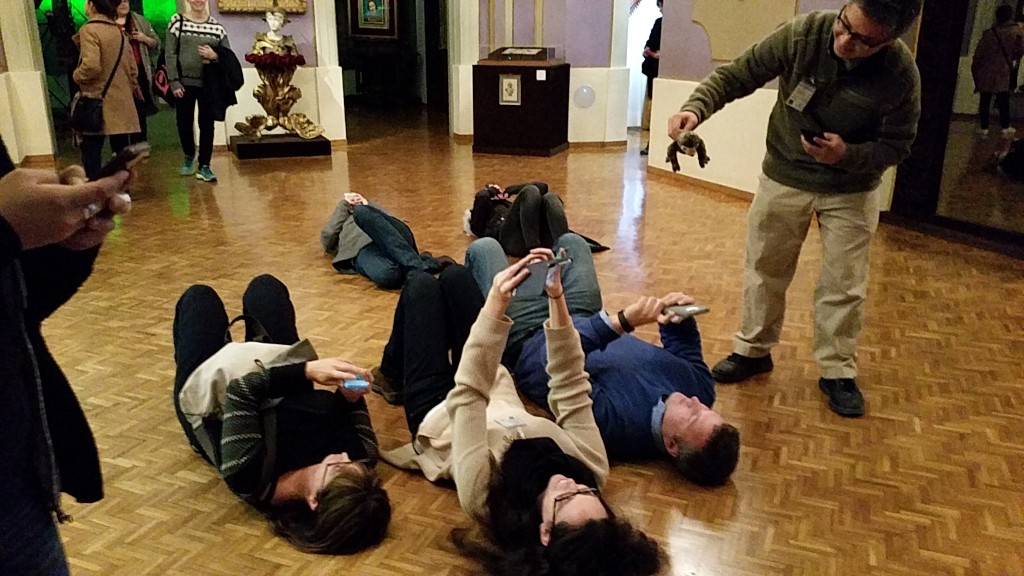
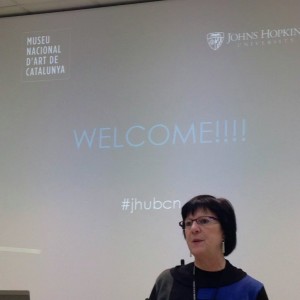
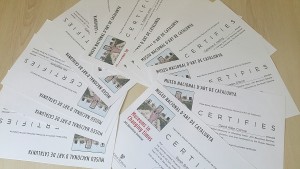
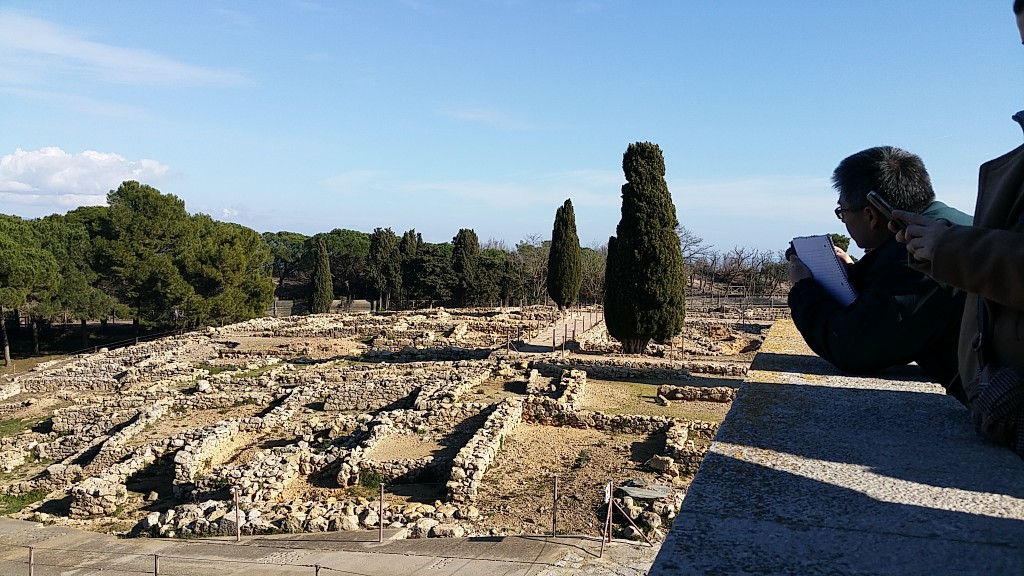
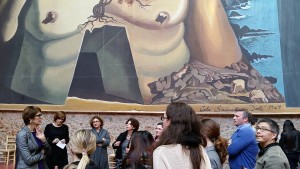
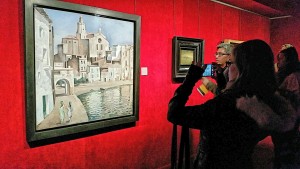
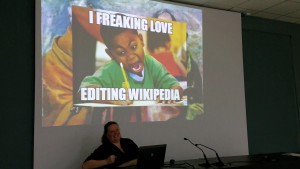
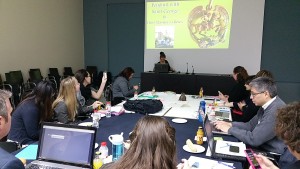






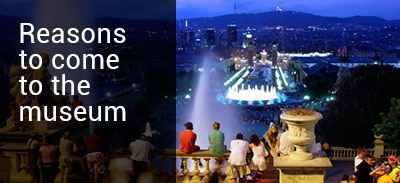
One comment
So cool Contxa Rodá, Do you have further information =???